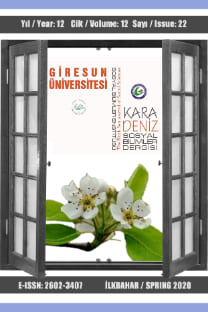Çalışma Hayatında Kadın Yönetici Olmak: Türkiye’de Sanayi Sektöründe Kadın Yöneticilerin Karşılaştıkları Sorunlar
Bu araştırmanın temel amacı, Türkiye'de ekonomiyi oluşturan tarım, sanayi ve hizmetler sektörlerindeki kadın istihdam oranlarını dünya verileriyle kıyaslamak ve ülkemizde bu sektörlerde çalışan kadınların iş gücüne katılımdaki yerlerini tespit etmektir. Araştırmanın ikinci amacı ise, bu sektörlerde kadın yöneticilerin kariyer yollarında karşılaştıkları muhtemel zorlukları ortaya koymaktır. Bu bağlamda, kadın yöneticilerin gerek özel hayatlarında üstlendikleri farklı roller gerekse iş yaşamında kadının yerine yönelik algılardan ve tutumlardan kaynaklanan sıkıntılarla karşılaşmış oldukları düşünülmektedir. Bu amaçla, orta ve üst düzey kadın yöneticilerden oluşan örneklem ile derinlemesine mülakatlar yapılmıştır. Araştırmada sanayi sektörünün kapsamı, Deloitte Araştırma şirketinin 2015 yılında ABD'de yaptığı kantitatif araştırma çerçevesinde belirlenmiştir. On beş kadın yönetici ile gerçekleştirilen derinlemesine mülakat sonuçları, Türkiye genelinde kadın çalışanlara yönelik yapılan araştırmaların, küçük bir grupta bile olsa yansımasını birebir göstermiştir. Araştırma kapsamında yöneltilen sorunları yaşamış ya da yaşamakta olan kadın yöneticilerin oranı % 54 ile %80 arasında değişmektedir
Being a Woman in Working Life: The Problems Faced by Women Managers in the Industrial Sector in Turkey
The main aim of this research is to compare the female labor force participation rates in agriculture, industry and services sectors of Turkish economy with the world level and to determine the place of women labor force participation in these sectors within our country. The second aim of the research is to identify the possible challenges that women managers face in their careers in these sectors. In this context, it is thought that female managers could have faced with troubles arising from different perceptions and attitudes about the place of women in business life both and in different roles in their private lives. For this purpose, in-depth interviews were conducted with middle and upper level women managers. The scope of the industry sector in the study was determined by the quantitative research conducted by Deloitte Research in the US in 2015. The results of the in-depth interviews with fifteen female executives showed that the researches on female employees in Turkey were reflected even in a small group. The proportion of female managers who have experienced or are experiencing problems within the scope of the research varies between 54% and 80%
___
Aguirre, D., Hoteit, L., Rupp, C. ve Sabbagh. K. (2012). Empowering the Third Billion. Women and the World of Work in 2012. Booz and Company, s:1-140 https://www.strategyand.pwc.com/media/file/Strategyand_Empoweringthe-Third-Billion_Full-Report.pdf.Başlevent, C. ve Onaran, Ö (2004). The Effect of Export-Oriented Growth on Female Labor Market Outcomes in Turkey”, World Development, August. Beneria, L. (2000) “Structural Adjustment Policies”, The Elgar Companion to Feminist Economics içinde, Editörler: J. Peterson ve Lewis, M. ,Cheltenham, UK., Edward Elgar, 687-695.
Bilgin, B. (2012). Ç alışma Yaşamında Kadın ve Yasal Düzenlemeler, http://tbbdergisi.barobirlik.org.tr/m2012-99- 1164, 311- 315.Erişim Tarihi, 13.10.2017
Bombuwela P. M., Chamaru, D. A. (2013). Effects of Glass Ceiling on Women Career Development in Private Sector Organizations – Case of Sri Lanka, Journal of Competitiveness, 5(2), 3-19.
Buğra, A ve Yakut-Çakar, B. (2010). Structural Change, Social Policy and Female Employment in Turkey, 41(3), BOUN Araştırma Raporu, 517–538.
Cuberes, D. ve Teignier, M. (2012). Gender Gaps in the Labor Market and Aggregate Productivity, Heffield Economic Research Paper Series.
Deloitte Development LLC. (2015). Women in manufacturing study Exploring the gender gap. https://www2.deloitte.com/content/dam/Deloitte/us/Documents/manufacturing/us-mfg-women-in-manufacturing2015-study.pdf, Erişim Tarihi: 02.02.2017.1-20.
Doğan, B. (2016). Çalışma Hayatının Kadının Beden ve Ruh Sağlığına Etkisi”, Karatahta İş Yazıları Dergisi, 51-76. Dünya Bankası (2017). https://data.worldbank.org/country/turkey?locale=tr, Erişim Tarihi: 14.02.2017.
Erdoğmuş, I. ve Çalışkan ,M. (2011). Online Group Buying: What Is There For The Consumers?. 7th International Strategic Management Conference Procedia Social and Behavioural Sciences, 24, 308–316.
Geçikli, F. ve Geçikli, M. (2012). İşyerlerinde Mobbing Psikolojik Şiddet Sempozyumu, Ankara Uluslararası Katılımlı Kadına ve Çocuğa Karşı Şiddet Sempozyumu, 27-28 Nisan 2012, Cilt:1, Mutlu Çocuklar Derneği Yayınları, Ankara.
Goldin, C. (1994). The U-Shaped Female Labor Force Function in Economic Development and History, NBER WorkingPaper Series, No: 4707, 634-639. Erişim tarihi: 10.02.2017.
İnce, M. (2010). How The Education Affects Female Labor Force? Empirical Evidence From Turkey. Procedia Social and Behavioral Sciences, 2, 634-639.
Karsavuran S. (2014). Sağlık Sektöründe Mobbing: Hastane Yöneticileri Üzerinde Bir Uygulama. Mustafa Kemal Üniversitesi Sosyal Bilimler Enstitüsü Dergisi, 11(26), 271-296.
Kılıç, D. ve Öztürk, S. (2014). Amme İdaresi Dergisi, 47(1),107-130.
Loko, B. ve Diouf, M. A. (2009). Revisiting the Determinants of Productivity Growth - What’s new? International Monetary Fund Working paper no:09/225,s:1-25.
Löfström, A. (2009) . Gender, Equality, Economic Growth and Employment, 1-46.
Özer, Mustafa ve Biçerli, K. (2003). Türkiye’de Kadın İşgücünün Panel Veri Analizi”, Anadolu Üniversitesi Sosyal Bilimler Dergisi, 3(1), 55-86.
Özler, S. (2000). Export Orientation and Female Share of Employment: Evidence From Turkey, World Development, 28, 1239-1248.
Tansel, A. (2002). Economic Development and Female Labor Force Participation in Turkey: Time-Series Evidence and Cross-Province Estimates, Middle East University Working Paper No. 02/3,1-61.
Tınaz, P. (2006). İşyerinde Psikolojik Taciz. Çalışma ve Toplum Dergisi, 3, 11-22.
Tınaz P. (2011), İş Yerinde Psikolojik Taciz (Mobbing), Beta Yayıncılık, İstanbul.
TOBB. (2015). http://www.tobb.org.tr/Documents/yayinlar/2016/72GK/72-Genel-KurulEkonomikRapor2015.pdf. Erişim Tarihi: Mart 2017.
TÜİK. (2017). http://www.tuik.gov.tr/PreHaberBultenleri.do?id=21519. Erişim Tarihi: 01. 03.2017.
WEF, (2016). http://reports.weforum.org/global-gender-gap-report-2016/ (Erişim Tarihi: Mart 2017)
- ISSN: 2602-3407
- Yayın Aralığı: Yılda 2 Sayı
- Başlangıç: 2009
- Yayıncı: -
Sayıdaki Diğer Makaleler
Biyolojide Kadın Bilim İnsanları
Girişimci Kadınların Bölge Kalkınmasına Katkıları; Artvin Örneği
Kurtuluş Savaşı (Milli Mücadele) Resimlerinde Anadolu Kadını İmgesi
Zrínyi Kadınları: Margit, Katalin (Kata), Dorottya (Dorica) ve Ilona Zrínyi
Kaynakça Louise Bourgeois’ın Heykelleri Üzerine Bir Değerlendirme
Sosyal Politika ve Toplumsal Cinsiyet Bağlamında İşyerinde Kadına Yönelik Cinsel Taciz
